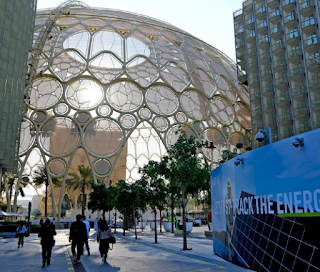Biden's Climate Conundrum: Fossil Fuels vs. Climate Leadership
President Biden's decision to skip COP28 in Dubai has sparked discussions about his stance on climate policies. Despite signing significant climate laws and overseeing record investments in clean energy, Biden's absence raises questions. The president faces challenges domestically, with centrists urging a focus on increased oil production and climate activists pushing for a halt to drilling. Internationally, developing countries expect the U.S. to fulfill climate-related financial promises, while Biden's absence from the summit may impact his climate credentials.
Biden's Climate Conundrum: Fossil Fuels vs. Climate Leadership
President Biden, a key figure in the fight against global warming, has opted to stay home during COP28 in Dubai, raising eyebrows and igniting debates about the administration's climate stance. Despite signing significant climate laws and overseeing record clean energy investments, Biden's absence at this crucial summit indicates a complex balancing act in the realm of climate and energy policies.
In a year projected to be the hottest in recorded history, Biden's decision not to attend has been attributed to his involvement in pressing global crises, particularly the Israel-Hamas conflict and efforts to secure aid for Ukraine in its battle against Russia. However, critics argue that skipping this summit diminishes an opportunity for Biden to reinforce his climate credentials on the international stage.
At home, Biden grapples with conflicting pressures. Centrists within his party advocate for a focus on increased oil production, emphasizing the record amounts of crude oil produced in the U.S. this year. Simultaneously, climate activists, especially the younger demographic that played a crucial role in electing Biden, demand a complete halt to drilling activities.
The international arena adds another layer of complexity, with developing countries urging Biden to fulfill promises of financial aid to combat climate change. However, Republicans in Congress remain skeptical, questioning the feasibility of such commitments.
Michele Weindling, the political director at the Sunrise Movement, a youth-led climate activist group, emphasizes that Biden's absence undermines his credibility on climate issues, particularly among the younger generation. On the other hand, David Victor, co-director of the Deep Decarbonization Initiative at the University of California San Diego, suggests that Biden faces the challenge of keeping the left together while also considering re-election concerns.
The article explores Biden's recent policy decisions, including permitting new oil leases and expediting liquid gas exports. While the U.S. has become the world's largest gas exporter under Biden, he has also signed the largest climate law in American history, pouring substantial government subsidies into green technologies.
As more than 100 world leaders gather in Dubai for COP28, including notable figures like King Charles III, Pope Francis, and President Emmanuel Macron, Biden's absence stands out. Notably, Chinese President Xi Jinping will also skip the event, further emphasizing the delicate global dynamics surrounding climate action.
The summit in Dubai is expected to address progress in limiting global warming and the challenging goal of keeping it below 1.5 degrees Celsius. Biden's decision not to attend leaves an open question about the United States' commitment to achieving these crucial climate targets.
#BidenClimateConundrum, #COP28, #FossilFuelsVsClimateAction, #ClimateLeadership, #GlobalWarmingDebate

